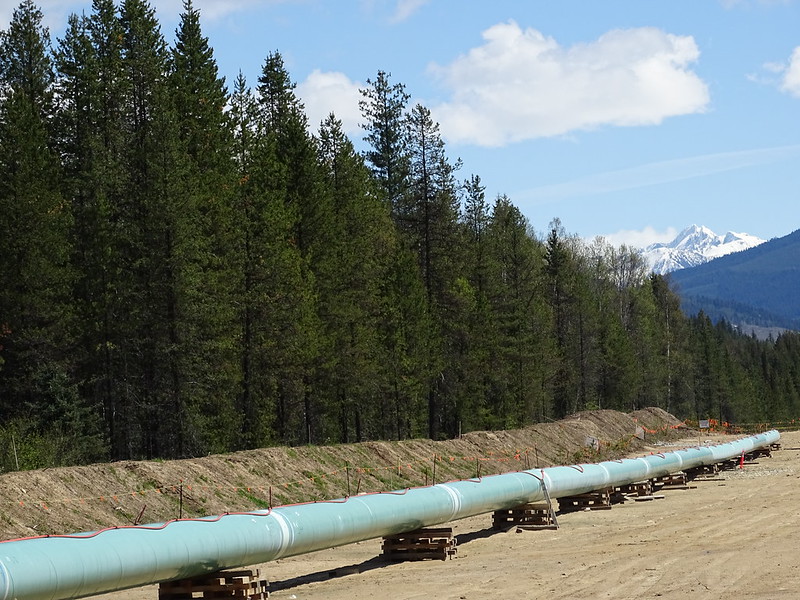Last year was one of the worst on record for climate change-related disasters, yet Canada’s federal government spent $18.6 billion supporting the fossil fuel and petrochemical industry.
A new report by the nonprofit Environmental Defence indicates that, despite record profits for the fossil fuel industry and Canadian claims to eliminate subsidies, the government of Justin Trudeau continues to spend massive quantities of public money supporting the primary cause of climate change.
“As people across Canada faced a fossil fuel affordability crisis, and climate disasters continued to ravage the country and the world, the government of Canada continued providing financial support to an industry that we need to be winding down in order to avoid catastrophic levels of warming,” Julia Levin, associate director of National Climate at Environmental Defence told DeSmog.
“Taxpayer handouts to Canada’s wealthiest companies means that less money is available for the types of investments that could actually help people across the country who are deciding between food and energy bills,” she said.
To put that in context, Environmental Defence’s “Canada’s Fossil Fuel Funding in 2023” report estimates that the Canadian government’s accumulated subsidies to the oil and gas sector over the last four years was at least $65 billion.
“That level of support could have fully funded every major wind and solar project in Canada from 2019 to 2021 12 times over,” said Levin. “It is 10 times what the government has invested in climate change adaptation since 2015. Around half of that, $35 billion, is enough to double transit ridership across the country over the next 12 years.”
The report identified specific subsidies including loan guarantees of $8 billion for the Trans Mountain Expansion pipeline (TMX), and $7.3 billion in public financing through Crown corporation Export Development Canada. The report also noted over $1.3 billion in subsidies for carbon capture and storage projects, and approximately $1.8 billion in tax breaks for the oil and gas and related sectors.
The Trans Mountain project, controversially acquired by the Trudeau government early in 2018, would not have been possible without considerable direct federal government financial support. Initially estimated to cost $5.4 billion to complete, the most recent cost estimates are $34 billion. In addition to the added climate risk of a new pipeline exporting Canadian oil, with an anticipated drop in the global demand for oil, the project remains a substantial financial risk—one of the reasons Kinder Morgan abandoned it in the first place. The pipeline has been called a ‘global warming machine.’
Major Cost to Society
Environmental Defence’s report further notes the oil and gas sectors’ cost to society — in terms of air pollution, climate change-related natural disasters, and/or extreme weather — is estimated at $52 billion for 2023 alone.
Environmental Defence has been tracking the Canadian government’s subsidies to the oil and gas sector for several years, and as Levin explained in an interview with DeSmog, the organization has noticed certain trends.
“With the exception of 2020 as a COVID year, federal support to the oil and gas industry has been consistently around $18 to 20 billion in recent years,” she said. “We are seeing an increase in subsidies for carbon capture, and we know these are set to rise as the CCUS [Carbon Capture, Utilization, and Storage] investment tax credit gets finalized.”
Carbon capture and storage is the oil and gas industry’s preferred solution to addressing climate change, and the Canadian and American federal governments have heavily subsidized the technology. Critics warn that, rather than lowering emissions, carbon capture is emissions intensive and will be used to increase oil production through a technique called “enhanced oil recovery.” As previously reported by DeSmog, federal and provincial governments in Canada are preparing to spend billions in carbon capture subsidies.
Similarly, so-called blue hydrogen (hydrogen derived from natural gas using carbon capture) is also a costly, carbon- and resource-intensive false solution promoted by industry and government alike.
Levin called carbon capture and hydrogen “dangerous distractions.”
“The government of Canada is finalizing a carbon capture investment tax credit as well as a hydrogen investment tax credit,” Levin pointed out. “Recent budget analysis from the Parliamentary Budget Office estimates that these two tax credits will collectively provide over $11 billion to carbon capture and hydrogen projects by 2028.”
“Despite 50 years of investment, carbon capture has never worked as promised,” said Levin.
Delaying Clean Energy Transition
“Most projects never make it off the ground; the few that do fail to deliver the promised emissions reductions,” she said. “Oil and gas companies know this is a dead-end technology that won’t make a dent in emissions but they are promoting it to delay the clean energy transition and wring out even more subsidies.”
Levin noted that hydrogen is also being used by oil and gas companies to justify continued, and even expanded, fossil fuel production.
The government’s misuse of public money isn’t limited to unproven technologies masquerading as climate change solutions. Environmental Defence’s report reveals that the same funds could have been used for new green energy projects and the development of public transit infrastructure, and could also have taken a bite out of Canada’s affordability crisis.
“At a time when Canadians are dealing with a cost of living crisis, that level of funding could have retrofitted millions of homes to make them more energy efficient, therefore reducing energy bills,” Levin said. “It could have been used to reduce Canadians’ dependence on fossil fuels by switching our cars, furnaces, and stoves to electric options, which shields households from the inflationary pressures caused by fluctuating oil prices.”
Levin notes that there are other types of subsidies that Environmental Defence did not include in their inventory.
“The climate pollution created by oil and gas companies has massive costs, including health costs, property damage from extreme weather events, and decreased agricultural productivity due to changing weather patterns,” she said.
The report also found that oil and gas companies get considerable breaks on carbon pricing, which forms yet another kind of subsidy.
Canada’s continued subsidies to the fossil fuel sector defy explanation in this era of climate change. But they also contradict the government’s official messaging on fighting global warming, and the Canadian public’s expectations of their government.
“Ending fossil fuel subsidies should be the low hanging-fruit of climate policy,” said Levin. “It’s painfully obvious that when you’re in a hole, the first thing you do is stop digging.”
While the government has promised to end funding to the fossil fuel industry, far more action is needed, Levin believes.
“Finance Minister Chrystia Freeland must use Budget 2024 to announce the immediate steps the government is taking to eliminate all of its financing to the oil and gas industry, as was promised back in 2021,” said Levin.
“Rather than subsidizing fossils we should be taxing their massive profits – and investing the revenues into clean energy measures that will benefit Canadians.”
Subscribe to our newsletter
Stay up to date with DeSmog news and alerts







